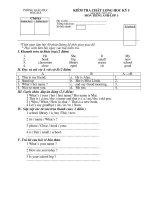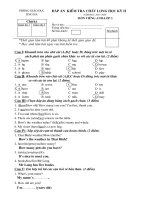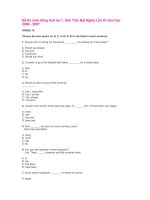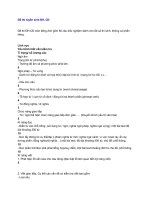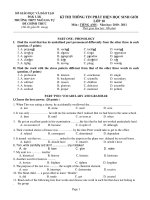- Trang chủ >>
- THPT Quốc Gia >>
- Ngoại Ngữ
Đề thi môn tiếng anh THPTQG
Bạn đang xem bản rút gọn của tài liệu. Xem và tải ngay bản đầy đủ của tài liệu tại đây (64.86 KB, 11 trang )
Đề số 1
Mark the letter A, B, C or D on your answer sheet to indicate the word whose
underlined part differs from the other three in pronunciation in each of the
following questions.
Question 1. A, plane
Question 2. A, pronounced
B, hand
C, bat
D, lack
B, developed
C, evolved
D, embarked
Mark the letter A, B, C or D on your answer sheet to indicate the word that
differs from the other three in the position of the primary stress in each of the
following questions.
Question 3. A, moment
B, action
Question 4. A, renovate
B, recommend
C, language
C, modernize
D, report
D, simplify
Mark the letter A, B, C or D on your answer sheet to indicate the correct
answer to each of the following questions.
Question 5. ...........artifacts from the early Chinese dysnaties , numerous
archealogists explored the southern Silk Road.
A, Search for
C, Searched for
B, Having searched for
D, To search for
Question 6. Unsurprisingly, he again spent all his allowance to buy a(n) ........video
game.
A, expensive new tiny
B, tiny new expensive
C, new expensive tiny
D, expensive tiny new
Question 7. The more qualifications you get,......you are in the academic field.
A, the most successful
B, as successfully as
C, the more successful
D, the more successfully
Question 8. The country has vaccinated 70% of its population since the first
vaccines......
A, had been produced
B, have been produced
C, were produced
D, are produced
Question 9. Hieu will send a present to her boss........
A, until he came back from his business trip.
B, as soon as he comes back from his business trip.
C, by the time he comes back from his business trip.
D, while he was coming back from his business trip.
Question 10. ........the sudden power failure, I had to cancel my online lesson.
A, Because of
B, Although
C, Because
D, in spite of
Question 11. Although modern information technologies can reduce the demand
for physical transport, the.......for transport continues to increase.
A, require
B, required
C, requirement
D, requiring
Question 12. He came back two days ago, ......?
A, didn’t he
B, hadn’t he
C, did he
D, had he
Question 13. There is a rumours that he is going to..... our company in two weeks .
A, take over
B, cut back
C, make up
D, fall behind
Question 14. His dream to become an interpreter was at last......
A, caused
B, fulfilled
C, made
D, haunted
Question 15. The explorers relied ......on an ancient map to find the ruins.
A, heavily
B, closely
C, tightly
D, thoroughly
Question 16. Students nowadays tend to pay more attention......environmental
issues.
A, with
B, from
C, in
D, to
Question 17. All the fruits in the fridge....., so I had to get rid of them.
A, went off
B, came up with
C, took care of
D, brought about
Question 18. She got completely the wrong end of the........I was offering her a
promotion and she thought she was getting fired.
A, branch
B, bark
C, ball
D, stick
Question 19. Our villages still lead a happy lifestyle ...... a lack of basic
conveniences.
A, because
B, despite
C, even though
D, due to
Mark the letter A, B, C or D on your answer sheet to indicate the word(s)
CLOSEST in meaning to the underlined bold word (s) in each of the
following questions.
Question 20. The price for footwear has declined dramatically , so many people
have taken advantage to buy their favorite shoes.
A, slightly
B, considerably
C, effectively
D, calmly
Question 21. The fire ruined the forest completely; all habitats were totally in the
flames.
A, impacted
B, decreased
C, improved
D, destroyed
Mark the letter A, B, C or D on your answer sheet to indicate the word(s)
OPPOSITE in meaning to the underlined bold word(s) in each of the
following questions.
Question 22. Although he had prepared carefully for the IELTS speaking test, he
got cold feet when asked an array of questions with abstract concepts.
A, had a fever
B, stayed confident
C, got nervous
D, became aggressive
Question 23. My teacher tried to bolster my confidence by saying that I had a
talent for English.
A, reinforce
B, discourage
C, clarify
D, represent
Mark the letter A, B, C or D on your answer sheet to indicate the most suitable
response to complete each of the following exchanges.
Question 24. Tom and James are talking about older people and young people.
Tom: “I believe that there’s no end to what younger generations can learn from the
old.”
James: “.......They can learn useful life skills from their grandparents.”
A, You can say that again.
B, I’m afraid you’re wrong.
C, Please don’t say that.
D, It’s alright.
Question 25. Jack is talking Peter, his new classmate, in the classroom.
Jack: “How do you get to school?”
Peter: “......”
A, Just 3 kilometers.
B, I would say no.
C, Not too expensive.
D, I go by bus.
Mark the letter A, B, C or D on your answer sheet to indicate the underlined
part that needs correction in each of the following questions.
Question 26. During the sixth century, the inhabitants of Gujarat(India) have
developed a method of gaining access to clean water.
A, During
B, have developed
C, gaining
D, to
Question 27. After last night’s storm, the injured bird was found dead in their nest.
A, storm
B, injured
C, dead
D, their
Question 28: The unprecedented pandemic has caused massive disruptions to the
country and the government is waiting until economic conditions are more
favorite.
A, unprecedented
B, disruptions
C, economic
D, favorite
Mark the letter A, B, C or D on your answer sheet to indicate the sentence that
is closest in meaning to each of the following questions.
Question 29. “I think you should revise your notes before the exam”, said my
father.
A, My father suggested revising my notes before the exam.
B, My father asked me to revise my notes before the exam.
C, My father advised me to revise my notes before the exam.
D, My father reminded me to revise my notes before the exam.
Question 30. The last time I paid a visit to the Great Wall of China was a few years
ago.
A, I haven’t paid a visit to the Great Wall of China for a few years.
B, I last pay a visit to the Great Wall of China a few years ago.
C, I never liked visiting the Great Wall of China a few years ago.
D, I no longer visited the Great Wall of China since a few years ago.
Question 31. It is required by law for men aged 18 and over to join the army.
A, Men aged 18 and over should join the army.
B, Men aged 18 and over need to join the army.
C, Men aged 18 and over can join the army.
D, Men aged 18 and over must join the army.
Mark the letter A, B, C or D on your answer sheet to indicate the sentence that
best combines each pair of sentences in the following questions.
Question 32. The weather is not good. I have to cancel my trip to Da Nang.
A, I wish the weather were good and I could have a trip to Da Nang.
B, If only the weather were good and I could cancel my trip to Da Nang.
C, If it weren’t for the good weather, I could continue my trip to Da Nang.
D, I have to cancel my trip to Da Nang as long as the weather is good.
Question 33. The party was a great success. The sporting celebrity attended the
party.
A, Had it not been for the attendence of the sporting celebrity, the party wouldn’t
have been successful.
B, Only after the party was a great success did the sporting celebrity attend the
party.
C, Hardly had the sporting celebrity attended the party when it was a great
success.
D, Successfully as the party was, the sporting celebrity still attended it.
Read the following passage and mark the letter A, B, C or D on your answer
sheet to choose the word or phrase that best fits each of numbered blanks.
Exploration has changed a lot over time. In the past, only adventurers who were
willing to take (34) __________ were considered explorers. In contrast, anyone
can be an explorer today thanks to modern technology.
In the past, when explorers traveled the world, people back home had to wait for
months to hear about their adventures. Explorers kept (35) __________ and wrote
letters about their experiences. They would only be able to tell
(36)__________what they saw after they returned. By the end of the nineteenth
century, explorers were also able to take photos in the same way (37)__________
they do today. However, they were unable to see the photos right away. It often
took a long time for them to get photos printed.
(38) __________, today’s explorers can travel around the globe and can send back
live, real-time images. Thanks to high-tech devices and the Internet, anyone can
interact with them. When a discovery is made, we can see photos on social media
and read blog posts the same day. We may not be there, but we still take part in the
adventure.
(Adapted from Thomas Fast, 2017)
Question 34:
A, dangers
B, possibilities
C, risks
Question 35:
A, magazines
B, journals
C, history
Question 36:
A, another
B, other
Question 37:
A, what
Question 38:
A, In the same way
B, where
C, By comparison
C, the others
C, that
D, chances
D, publication
D, others
D, when
B, On one hand
D, Similarly
Read the following passage and mark the letter A, B, C, or D to indicate the correct
answer to each of the questions from 39 to 43.
When I surveyed over 5,000 middle grade students for my book, kids were already
reminding me of the technology gap between them and their parents. They claimed
that parents “didn’t have a clue” as to what they were experiencing on screens.
While generation gap is often characteristic of adolescence in any generation, it is
even wider because of rapidly changing technology.
Even the guidelines I prescribed six years ago would be impossible to implement
for this generation of tablets, cellphones and notebooks that travel in children’s
backpacks. Setting and enforcing guidelines early for children is helpful. Taking
technology away at bedtime is still possible and at least allows them a good night’s
rest. Cautioning your children about not sharing real names, addresses or phone
numbers in chatrooms or for any emails protects them somewhat. Making sure
your hardworking home is balanced by non-screen family fun can be enormous
protection. Beware of over-consequencing and over-punishing for small problems.
We don’t want your children to think of their parents as enemies in a battle of wills.
Tell your children how wise and experienced you are and how much you love them
at least five times a week. They need to know they can count on you in this
complex, fast-moving world even if they know more about technology than you
do. Like every generation, your children will grow up and hopefully find
responsible directions for their own lives. Technology skills are valued in the work
force and technology is here to stay. Learning as much about it as possible will
help you stay tuned-in to what your children aren’t saying.
(Source: />
Question 39: Which could be the best title of the passage?
A. Technology – a great challenge to parents.
B. Negative aspects of technology.
C. Kids don’t want to talk about their lives.
D. Technology facilitates communication.
Question 40: The word “it” in paragraph 1 refers to __________.
A. characteristic
B. middle grade student
C. generation gap
D. technology gap
Question 41: According to the passage, what shouldn’t the parents do in order to
regulate the
children’s use of technology?
A. Confiscating the technology when bedtime comes.
B. Preserving time for activities beyond screens and technology.
C. Warning kids against oversharing on social media.
D. Demanding kids to share with the parents all their passwords.
Question 42: The word “tuned-in” in paragraph 3 mostly means __________.
A. oblivious
B. alien
C. sensitive
D. helpful
Question 43: Which of the following is TRUE about the technology in this day
and age?
A. Guidelines for technological parental control are still the same.
B. People can’t live successfully without technical skills.
C. Technology has made community activities more crucial than ever.
D. The detrimental effects of technology are holding it back.
Read the following passage and mark the letter A, B, C, or D on your answer sheet
to indicate the correct answer to each of the questions from 44 to 50.
If we really care about nature, then surely conservation has to be practical; it needs
to work. Everything we hear on the news seems to say the opposite: nature
continues to go down the tube; extinction rates are increasing; new threats like
climate change are emerging; and beautiful places are being destroyed before our
eyes. All this is true; and yet…
If things are getting worse, it is obvious that conservation is failing. Well, no. In
2006, scientists at BirdLife International showed that conservation action had
prevented 16 bird species from going extinct during the 1994-2004 time period. In
2014, scientists from the Durrell Wildlife Conservation Trust found that sustained
conservation action from 1988 to 2012 resulted in eight species being down-listed
to lower categories of threat on the IUCN Red List of Threatened Species. In a
pivotal study in 2015, a group of researchers from the IUCN Species Survival
Commission found that without conservation action that took place between 1996
and 2008, the status of the world’s ungulates (deer, antelopes, cattle and their
relatives) would have been nearly eight times worse than was actually observed. In
2017, researchers were able to quantify how conservation investments made
between 1996 and 2008 reduced biodiversity loss in 109 countries by 29% per
country on average.
Once again, this suggests that although too little was spent on conservation, it had a
significant level of success. As a result, decision-makers are now in a position, for
the first time, to forecast what the positive impacts of any increase in conservation
spending are likely to be in relation to different scenarios of human development
pressure, and then compare these forecasts to their policy targets.
There is one clear conclusion from these and similar studies: conservation does
work, but we do not do anywhere close to enough of it. The threats to nature are
certainly growing and this means that we have to spend more on conservation just
to stand still. On the other hand, if some of the commitments made by the world’s
governments are actually acted upon, such as the 2010 Aichi Biodiversity Targets
and the 2015 Sustainable Development Goals, then the number of resources to be
allocated to conservation is set to increase. Let’s hope that this will indeed be the
case.
(Source: />Question 44: Which question is the passage most possibly the answer to?
A. What exactly do conservationists need to do?
B. Why do we conserve nature in the first place?
C. Does conservation actually work?
D. What is and isn’t conservation?
Question 45: The word “emerging” in paragraph 1 can be replaced
by__________.
A. proceeding
B. waning
C. popping
D. arising
Question 46: According to paragraph 2, what is NOT mentioned as a successful
effort in conservation?
A. Many bird species were brought back from the brink of extinction.
B. Situation of the ungulates has become better.
C. Eight species are now less at risk of extinction.
D. The decline in biological diversity in many countries slowed down.
Question 47: The word “quantify” in paragraph 2 can be replaced by
__________.
A. evaluate
B. rate
C. determine
D. judge
Question 48: The word “this” in paragraph 4 refers to __________.
A. establishing new conservation goals
B. support from the governments
C. the amount of resources
D. more investment in conservation
Question 49: According to the passage, the overall situation is getting worse,
__________.
A. and could turn even worse within the next decade.
B. despite some small local successes in conservation.
C. but not as fast as if we were doing no conservation at all.
D. yet many people still think that we are making progress.
Question 50. Which statement is NOT true, according to the passage?
A. There is increasing evidence that conservation is actually working.
B. There are many different views on how to achieve conservation.
C. Governments will need to do more to reach the necessary level of success.
D. Deers and antelopes are the species belonging to the ungulates group.

